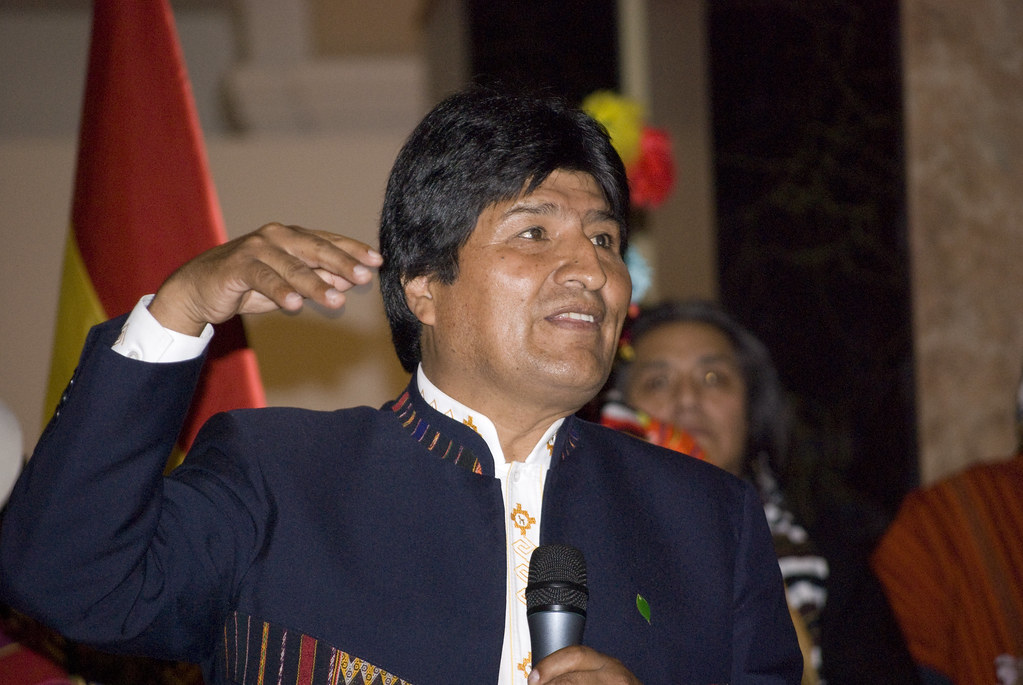UPDATE 2-Bolivia seeks new leader as Morales heads to Mexico for refuge

- Country:
- Bolivia
Bolivia's former leader Evo Morales was heading to Mexico to seek asylum on Tuesday as security forces quelled violence over the long-serving leftist's resignation and opponents sought an interim replacement to fill the power vacuum.
Morales, who quit after weeks of protests over a disputed October election, flew in a Mexican Air Force airplane from the town of Chimore, a stronghold where Bolivia's first indigenous president had retreated to as his 14-year rule imploded. Opposition lawmakers wanted to formally accept Morales' resignation and start planning for a temporary leader ahead of a new vote. But their plans looked at risk as Morales' Movement for Socialism (MAS) said it would boycott the meeting.
Residents of the highland capital La Paz, rocked by protests and looting since the Oct. 20 vote, said they hoped politicians would succeed in finally restoring order. "Democracy has been at risk and hopefully it will be resolved today," said resident Isabel Nadia.
Morales' flight out was far from simple. Takeoff was delayed, with supporters surrounding the airport, then the plane was denied permission to fuel in Peru, Mexico's Foreign Minister Marcelo Ebrard told a news conference. So it stopped instead in Paraguay and was now due to arrive in Mexico City about 11 a.m. local time (1700 GMT).
"His life and integrity are safe," Ebrard said, tweeting a photo of Morales alone in the jet with a downcast expression, displaying Mexico's red, white and green flag across his lap. In a region divided along ideological lines over Morales' fall, Mexico's leftist government has supported his accusations of a coup against him by political rivals.
In La Paz, roadblocks were in place after soldiers and police patrolled into the night to stop fighting between rival political groups and looting that erupted after Morales' resignation.
FORMER COCA FARMER
The charismatic 60-year-old former coca leaf farmer was beloved by the poor when he won power in 2006. But he alienated some by insisting on seeking a fourth term, in defiance of term limits and a 2016 referendum in which Bolivians voted against him being allowed to do that.
The government collapsed on Sunday after the Organization of American States (OAS) delivered a damning report on irregularities during the October vote, prompting ruling party allies to quit and the army to urge Morales' departure. With Morales' deputy and many allies in government and parliament also gone, opposition politician and Senate second vice-president, Jeanine Anez, was theoretically in line to take the top job temporarily and said she would accept.
However, in a sign of the complex path ahead, Anez tweeted a memo from Morales' MAS, which said she was part of a coup and that Adriana Salvatierra, the Senate leader who resigned on Sunday, should instead lead the transition. "Don't they know that the ex-President of the Senate publicly resigned?" she wrote.
In Bolivia and around Latin America, detractors have exulted in the fall of a "dictator" while Morales' supporters are denouncing a coup by right-wing foes determined to put Bolivia's capitalist elite back in charge. After U.S. President Donald Trump on Monday hailed Morales' departure as good for democracy, a U.S. official said his administration had no objection to Mexico granting asylum to Morales, and hoped his departure could stabilize the situation in Bolivia, though much depended on Morales' stance.
Paraguayan President Mario Abdo said on Tuesday his country had also been willing to grant political asylum to Morales, though he disagreed with accusations of a coup. "If he resigned, it is not a coup. He resigned," he said.
Earlier on Tuesday, Morales' Defense Minister Javier Zavaleta also quit, urging election runner-up Carlos Mesa and protest leader Luis Fernando Camacho to avoid violence. Morales achieved steady economic growth in one of the region's poorest nations and was for many years hugely popular, but his successful legal challenge to a 2016 referendum stopping him running for another term brought accusations of autocracy.
His departure has added to a wave of unrest around Latin America, including in nearby Ecuador and Chile, where protesters have been berating leaders over social inequalities.
(This story has not been edited by Devdiscourse staff and is auto-generated from a syndicated feed.)
ALSO READ
Protesters blockade Peru's Las Bambas mine after talks fall through
Peru changes its mind over tit-for-tat visa requirement for Mexico visitors
US Senate votes to reject rule to cut greenhouse gas emissions on highways
US Senate panel chair issues subpoena in Supreme Court ethics probe
Peru's dengue deaths triple as climate change swells mosquito population










